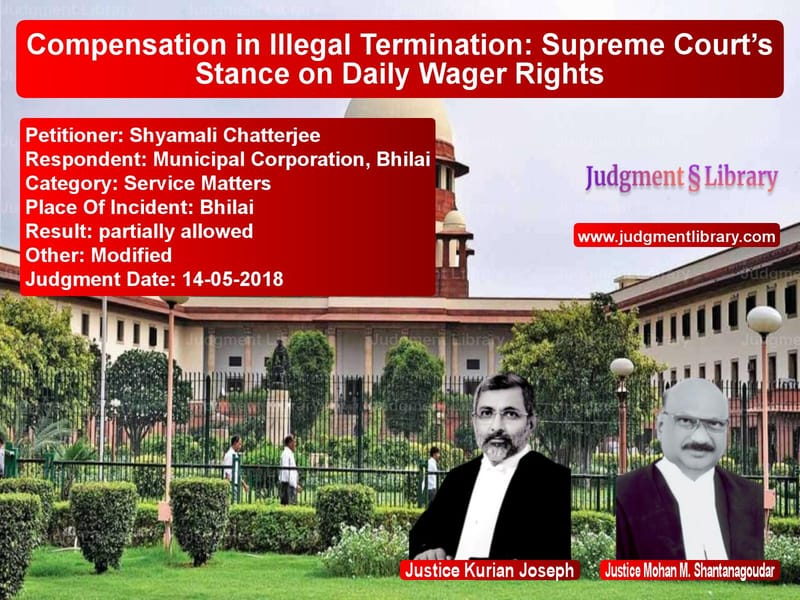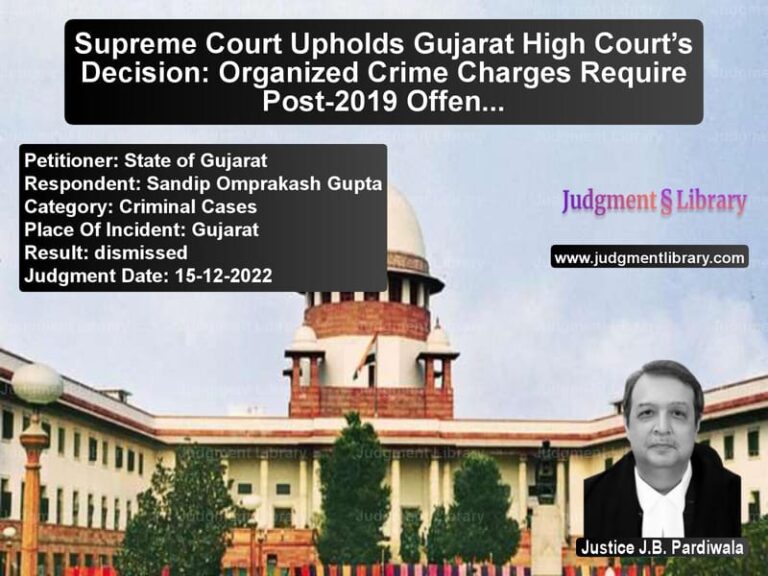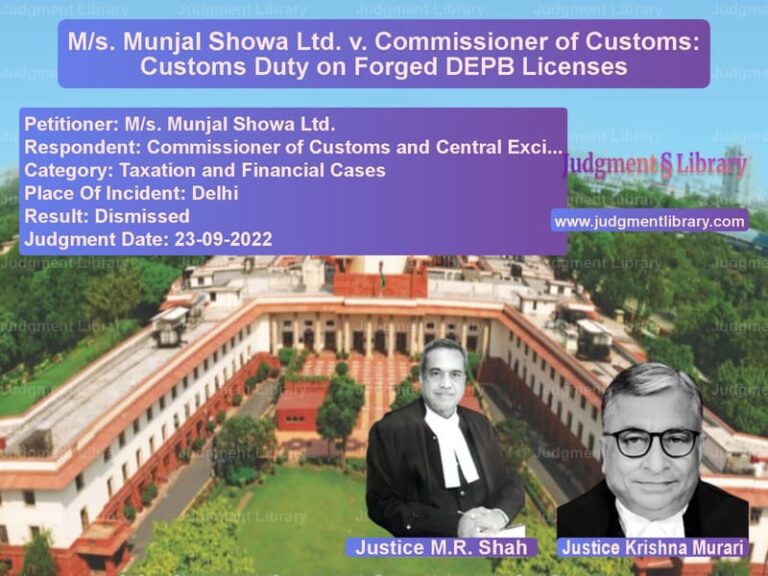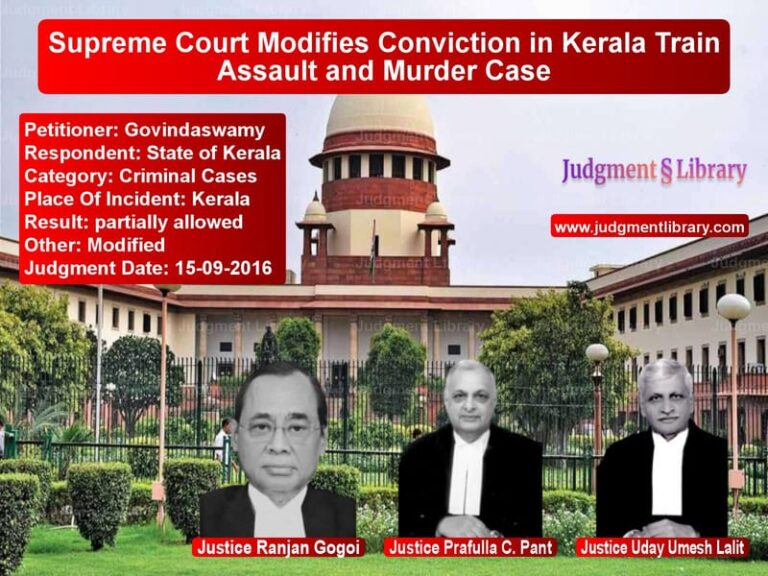Compensation in Illegal Termination: Supreme Court’s Stance on Daily Wager Rights
The case of Shyamali Chatterjee vs. Municipal Corporation, Bhilai presents a significant legal battle concerning the rights of daily wage workers and their entitlement to compensation upon illegal termination. The Supreme Court had to determine whether the compensation awarded to the appellant was just and equitable given the circumstances.
The appellant, Shyamali Chatterjee, had worked as a daily wager for about 15 years. Following her termination, the Labour Court awarded her compensation of Rs. 5,00,000. However, the High Court reduced this amount to Rs. 2,00,000, prompting her to appeal before the Supreme Court. The primary issue before the Court was whether the High Court was justified in reducing the compensation amount.
Case Background
Shyamali Chatterjee had been employed as a daily wage worker under the Municipal Corporation, Bhilai. After serving for 15 years, she was terminated without being reinstated or offered adequate compensation. She contested this decision before the Labour Court, which ruled in her favor, granting her a compensation amount of Rs. 5,00,000. However, the Municipal Corporation challenged this decision in the High Court, which reduced the compensation to Rs. 2,00,000.
Aggrieved by the High Court’s reduction, Chatterjee approached the Supreme Court, seeking justice and restoration of the initial compensation amount.
Legal Issues Raised
- Whether a daily wage worker with 15 years of service should be entitled to higher compensation upon illegal termination.
- Whether the High Court was justified in reducing the compensation from Rs. 5,00,000 to Rs. 2,00,000.
- Whether the principle of reinstatement applies to daily wage employees who have worked for an extended period.
- The role of interest in compensation payments and the timeframe for the employer to disburse the amount.
Arguments by the Parties
Arguments by the Appellant (Shyamali Chatterjee)
- The appellant argued that she had worked continuously for 15 years as a daily wager, thereby acquiring certain rights that should have been considered by the High Court.
- She contended that her termination was illegal and that the Labour Court had appropriately determined the compensation amount at Rs. 5,00,000.
- She emphasized that reducing her compensation to Rs. 2,00,000 was unjust and did not adequately compensate her for the loss of livelihood.
- She requested the restoration of the original compensation amount and sought additional relief in the form of interest.
Arguments by the Respondent (Municipal Corporation, Bhilai)
- The Municipal Corporation argued that as a daily wage worker, the appellant was not entitled to reinstatement.
- They contended that the compensation amount of Rs. 2,00,000 as awarded by the High Court was sufficient and in line with precedents.
- They argued that the employer had already agreed to pay the amount and that no further enhancement was necessary.
- They also stated that granting additional compensation could set a precedent leading to excessive financial burdens on municipal bodies.
Supreme Court’s Observations
After carefully analyzing the facts of the case and legal precedents, the Supreme Court ruled in favor of the appellant, granting her additional compensation of Rs. 1,50,000. The Court took into account the length of service and the financial implications of illegal termination on the appellant.
The Court stated:
“Having regard to the entire facts and circumstances of the case, we are of the view that the appellant should be entitled to an additional amount of Rs.1,50,000 (Rupees One Lac Fifty Thousand).”
Furthermore, the Court directed that the additional amount be paid within two months, along with an interest rate of 6% per annum from the date of termination.
Final Verdict
The Supreme Court allowed the appeal and ruled:
- The appellant was entitled to an additional Rs. 1,50,000 over and above the Rs. 2,00,000 awarded by the High Court.
- The total compensation amounted to Rs. 3,50,000.
- The amount was to be paid within two months.
- An interest rate of 6% per annum would apply from the date of termination.
- The amount awarded by the High Court was to be released without additional interest.
Implications of the Judgment
This ruling has significant implications for labor rights, particularly concerning daily wage workers:
- It reaffirms the rights of daily wage workers who have served for long durations to receive fair compensation upon termination.
- It establishes that courts must consider the length of service and economic hardship caused by termination when determining compensation.
- The judgment sets a precedent for awarding reasonable compensation to illegally terminated daily wagers.
- Municipal corporations and other employers must ensure that daily wage workers are treated fairly and are provided with just compensation upon termination.
Conclusion
The case of Shyamali Chatterjee vs. Municipal Corporation, Bhilai, highlights the importance of fair compensation for daily wage workers upon illegal termination. While reinstatement may not always be an option, compensation should be determined in a manner that ensures financial security for the affected individual. The Supreme Court’s ruling serves as a guiding principle for future cases concerning labor rights and illegal termination disputes.
Petitioner Name: Shyamali Chatterjee.Respondent Name: Municipal Corporation, Bhilai.Judgment By: Justice Kurian Joseph, Justice Mohan M. Shantanagoudar.Place Of Incident: Bhilai.Judgment Date: 14-05-2018.
Don’t miss out on the full details! Download the complete judgment in PDF format below and gain valuable insights instantly!
Download Judgment: Shyamali Chatterjee vs Municipal Corporatio Supreme Court of India Judgment Dated 14-05-2018.pdf
Direct Downlaod Judgment: Direct downlaod this Judgment
See all petitions in Employment Disputes
See all petitions in Termination Cases
See all petitions in Pension and Gratuity
See all petitions in Judgment by Kurian Joseph
See all petitions in Judgment by Mohan M. Shantanagoudar
See all petitions in partially allowed
See all petitions in Modified
See all petitions in supreme court of India judgments May 2018
See all petitions in 2018 judgments
See all posts in Service Matters Category
See all allowed petitions in Service Matters Category
See all Dismissed petitions in Service Matters Category
See all partially allowed petitions in Service Matters Category






